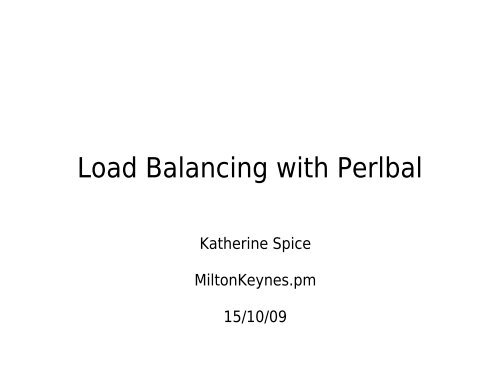Load Balancing with Perlbal - Milton Keynes Perl Mongers
Load Balancing with Perlbal - Milton Keynes Perl Mongers
Load Balancing with Perlbal - Milton Keynes Perl Mongers
You also want an ePaper? Increase the reach of your titles
YUMPU automatically turns print PDFs into web optimized ePapers that Google loves.
<strong>Load</strong> <strong>Balancing</strong> <strong>with</strong> <strong><strong>Perl</strong>bal</strong>Katherine Spice<strong>Milton</strong><strong>Keynes</strong>.pm15/10/09
What is <strong>Load</strong> <strong>Balancing</strong>?
Why and when might you use<strong>Load</strong> <strong>Balancing</strong>?●Capacity: you aren't able to meet the demandon your service <strong>with</strong> a single server●Resilience: you want to be able to cope <strong>with</strong>the failure of a server
Considerations in choosing a<strong>Load</strong> BalancerFeaturesCost➢Type of traffic➢Commercial Hardware:➢Layer 3 / 4 (IP/TCP) vs Layer 7 (applicationspecific, e.g. HTTP)F5 BigIP, Citrix NetScaler, Cisco ACEEasy, fast, ££££ to £££,£££!➢<strong>Balancing</strong> algorithm➢➢➢random choiceround robinmanual weighting➢Commercial Software:Citrix VPX, Zeus ZXTMup to ££,£££➢automated weighting based onenvironment such as:➢OSS:➢➢➢reported loadresponse timeavailable connectionsLVS, Balance, <strong><strong>Perl</strong>bal</strong>Free
So, if you're after a free, high performance,software HTTP load balancer.....<strong><strong>Perl</strong>bal</strong>
BackgroundFirst release was in 2005Danga Interactive / Brad Fitzpatrickhttp://www.danga.com/perlbal/“needed internal redirects, tried to hack it onto 4 others load balancers, buttoo painful. Easier to write our own, then once we had it we were able tostart doing tons more tricks and had a lot more visibility into what was goingon. Also our performance went up a ton, as <strong><strong>Perl</strong>bal</strong>'s load balancing is justbetter than anything else we tried. (and we went through a ton of loadbalancers)”
<strong><strong>Perl</strong>bal</strong><strong><strong>Perl</strong>bal</strong> is a <strong>Perl</strong>-based reverse proxy loadbalancer and web server.It processes hundreds of millions of requests aday just for LiveJournal, Vox and TypePad anddozens of other "Web 2.0" applications.
Features●Maintains pool of connected backend connections to reduce turnover●Intelligent load balancing based on what backend connections are free fora new request.●Almost everything can be configured or reconfigured on the fly <strong>with</strong>outneeding to restart the software●Has a high priority queue for sending requests through to backendsquickly (based on cookies or URI or host).●Configurable header management before sending request to backend●Internal redirection to file or URL(s) transparent to the client.●Can verify that a backend connection is talking to a webserver and not justthe kernel's listen queue before sending client requests at it.●Is extendable via plugins
Obtaining and InstallingCurrent version: 1.73CPANhttp://search.cpan.org/dist/<strong><strong>Perl</strong>bal</strong>/perl -MCPAN -e shellcpan-> install <strong><strong>Perl</strong>bal</strong>Ubuntu packageshttps://edge.launchpad.net/~awmcclain/+archive
ConfiguringDefault config file: /etc/perlbal/perlbal.confCREATE POOL my_apachesPOOL my_apaches ADD 10.0.0.10:8080POOL my_apaches ADD 10.0.0.11:8080POOL my_apaches ADD 10.0.0.12POOL my_apaches ADD 10.0.0.13:8081CREATE SERVICE balancerSET listen = 0.0.0.0:80SET role= reverse_proxySET pool= my_apachesSET persist_client = onSET persist_backend = onSET verify_backend = onENABLE balance
Configuring alt.CREATE POOL dynamicSET nodefile = conf/nodelist.datCREATE SERVICE balancer2SET listen = 0.0.0.0:81SET role= reverse_proxySET pool= dynamicENABLE balancer2
Running$ ./perlbal --helpUsage: perlbal [OPTS]--helpThis usage info--version Print perlbal release version--config=[file] Specify <strong><strong>Perl</strong>bal</strong> config file(default: /etc/perlbal/perlbal.conf)--daemonDaemonize$ ./perlbal -d
ManagingAdd this to config file:# always good to keep an internal management port open:CREATE SERVICE mgmtSET role = managementSET listen = 127.0.0.1:60000ENABLE mgmt$ telnet 127.0.0.1:60000pool my_apaches ADD 10.0.0.14SHOW POOLCREATE POOL new_apachespool new_apaches add 10.0.0.15set balancer pool = new_apaches
Monitoring<strong><strong>Perl</strong>bal</strong> provides the following via the management interface, all in machinereadable format.* CPU usage (user, system)* Total requests served across all services* Requests service by individual backends* <strong><strong>Perl</strong>bal</strong> uptime* All connected sockets* Outstanding connections to backends* Backends that have recently failed verification* Pending backend connections by service* Total of all socket states by socket type* Size (in seconds and number of connections) of all queues* State of reproxy engine (queued requests, outstanding requests,backends)* <strong>Load</strong>ed plugins per service
Extending<strong><strong>Perl</strong>bal</strong> supports the concept of having per-service and global plugins thatcan override many parts of request handling and behavior, via hooks.Global hooks<strong><strong>Perl</strong>bal</strong>::register_global_hook('foo', sub { return 0; });Service handler hooks$service->register_hook('bar', sub {# do somethingreturn 1;});Service general hooks
HooksExamples:HANDLER start_web_request <strong><strong>Perl</strong>bal</strong>::ClientHTTPWhen a 'web' service has gotten headers and is about to serve it... returna true value to cancel the default handling of web requests.HANDLER start_send_file <strong><strong>Perl</strong>bal</strong>::ClientHTTPBaseCalled when we've opened a file and are about to start sending it to theuser using sendfile. Return a true value to cancel the default sending.HANDLER start_serve_request <strong><strong>Perl</strong>bal</strong>::ClientHTTPBase, $uri_refCalled when we're about to serve a local file, before we've done anywork. You can change the file served by modifying $uri_ref, and cancel theprocess by returning a true value.
Plugin ConfigIn perlbal.confLOAD MyPluginCREATE SERVICE balancerSET listen = 0.0.0.0:80SET role= reverse_proxySET pool= my_apachesSET persist_client = onSET persist_backend = onSET verify_backend = onSET plugins= MyPluginENABLE balancer
Plugin Structurepackage <strong><strong>Perl</strong>bal</strong>::Plugin::MyPlugin;use strict;use warnings;# Called when we are loaded, do set up and global commandsheresub load { return 1; }# Clear our global commandssub unload { return 1; }# called when we're being added to a servicesub register { return 1; }# called when we're no longer active on a servicesub unregister { return 1; }1;
Extracted from <strong><strong>Perl</strong>bal</strong>::Plugin::Log athttp://www.eamondaly.com/perl/<strong><strong>Perl</strong>bal</strong>/Log.pmsub load {my $class = shift;<strong><strong>Perl</strong>bal</strong>::register_global_hook('manage_command.logname', sub {my $mc = shift->parse(qr/^logname\s+(?:(\w+)\s+)?\s*=\s*(.+)\s*$/,"usage: LOGNAME [] = ");my ($svc_name, $logname) = $mc->args;unless ($svc_name ||= $mc->{ctx}{last_created}) {return $mc->err("omitted service name not implied from context");}my $ss = <strong><strong>Perl</strong>bal</strong>->service($svc_name);return $mc->err("Service '$svc_name' is not a web_server service")unless $ss && $ss->{role} eq "web_server";my $fh;$logname =~ s/^\"//;$logname =~ s/\"$//;if ($logname =~ s/^\|\s*//) {$fh = new IO::Pipe;eval { $fh->writer($logname) };# Note that the ability to capture any errors here will# depend largely on your OS and shellreturn $mc->err("Failed to open '$logname': $@")if $@;}else {$fh = new IO::File $logname, O_WRONLY|O_APPEND|O_CREAT;return $mc->err("Failed to open '$logname': $!")unless $fh;}$fh->autoflush(1);$logobjs{$svc_name}->{'service'} = $ss;$logobjs{$svc_name}->{'fh'} = $fh;});return $mc->ok;}return 1;
sub register {my ($class, $svc) = @_;$svc->register_hook('Log', 'start_web_request', sub {my <strong><strong>Perl</strong>bal</strong>::ClientHTTP $client = shift;$client->{'scratch'}->{'Log:start_web_request'} =[ gettimeofday() ];return 0;});$svc->register_hook('Log', 'end_web_request', sub {&log_request(shift);});return 0;}return 1;
sub log_request {my <strong><strong>Perl</strong>bal</strong>::ClientHTTP $client = shift;my <strong><strong>Perl</strong>bal</strong>::HTTPHeaders $req_headers = $client->{req_headers};my <strong><strong>Perl</strong>bal</strong>::HTTPHeaders $res_headers = $client->{res_headers};my $start_time = delete $client->{'scratch'}->{'Log:start_web_request'};my $req_time = sprintf('%.3f', &tv_interval($start_time)) if $start_time;if ($client && $req_headers && $res_headers) {my $svc = $client->{'service'};if (my $fh = $logobjs{$svc->{'name'}}->{'fh'}) {my $auth;if ($req_headers->{'headers'}{'authorization'} =~ /^Basic (.+)/) {($auth, undef) = split(/:/, decode_base64($1), 2)}my $referer = $req_headers->{'headers'}{'referer'};$referer =~ s/"/\\"/g;my $ua = $req_headers->{'headers'}{'user-agent'};$ua =~ s/"/\\"/g;}}printf $fh qq{%s - %s [%s] "%s" %d %d "%s" "%s" %s %s %s %s\n},$client->peer_ip_string,$auth || '-',strftime('%d/%b/%Y:%H:%M:%S %z', localtime),$req_headers->{'requestLine'},$res_headers->response_code,$res_headers->content_length,$referer || '-',$ua || '-',$req_headers->{'headers'}{'host'} || '-',$req_time || '-',$svc->name,$svc->role;}
# If there's no existing hook for end_web_request in# http_response_sent, add one.if (! exists &<strong><strong>Perl</strong>bal</strong>::Service::end_web_request) {# Add dummy hook*<strong><strong>Perl</strong>bal</strong>::Service::end_web_request = sub { };# Copy the original http_response_sent*_http_response_sent_orig =*<strong><strong>Perl</strong>bal</strong>::ClientHTTPBase::http_response_sent;}# Override <strong>with</strong> our own, which includes the hook*<strong><strong>Perl</strong>bal</strong>::ClientHTTPBase::http_response_sent =*_http_response_sent;sub _http_response_sent {my <strong><strong>Perl</strong>bal</strong>::ClientHTTPBase $self = shift;$self->{'service'}->run_hook('end_web_request', $self);}_http_response_sent_orig($self);
Documentation"Much more documentation needs to happen..."http://www.danga.com/perlbal/Active user group at:http://groups.google.com/group/perlbal
Releases<strong><strong>Perl</strong>bal</strong>-1.60 - 24 Oct 2007<strong><strong>Perl</strong>bal</strong>-1.70 - 09 Mar 2008<strong><strong>Perl</strong>bal</strong>-1.71 - 14 Sep 2008<strong><strong>Perl</strong>bal</strong>-1.72 - 22 Sep 2008Latest version: <strong><strong>Perl</strong>bal</strong>-1.73 - 05 Oct 2009And from the release announcement"We're aiming at doing a second release in 1-3 weeks..."
Thank you and any questions?











